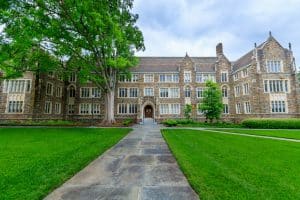Hamilton College vs Davidson: A Comprehensive Comparison
Are you looking for a top-tier liberal arts college in the United States? Two schools that might be on your radar are Hamilton College and Davidson. In this comprehensive comparison, we’ll dive into the similarities and differences between Hamilton College vs Davidson, providing prospective students with valuable insights that will help them make an informed decision.
Overview of Hamilton College and Davidson
Hamilton College and Davidson are both prestigious liberal arts colleges located on the eastern coast of the United States. Both schools have a reputation for academic rigor, close-knit communities, and a commitment to educating the whole person. Hamilton is located in Clinton, New York, while Davidson is located in Davidson, North Carolina. Both schools have a rich history and a well-deserved reputation for academic excellence.
Hamilton College has a student body of approximately 2,000 students, while Davidson has a slightly smaller student body of around 1,900 students. Despite their small size, both schools offer a wide range of academic programs and extracurricular activities, including athletics, music, theater, and community service.
Hamilton College is known for its strong emphasis on writing and communication skills, with a required writing-intensive curriculum for all students. Davidson, on the other hand, is known for its strong commitment to service and leadership, with a required community service component for all students. Both schools provide a well-rounded education that prepares students for success in a variety of fields.
Location and Campus Size
Hamilton College and Davidson are located in very different parts of the United States. Hamilton is situated in upstate New York, while Davidson is located in the southern state of North Carolina. Hamilton College boasts a campus of 1,300 acres, while Davidson’s campus is more compact at just 841 acres.
Despite their differences in location and campus size, both Hamilton College and Davidson offer unique opportunities for students. Hamilton’s location in upstate New York provides access to a variety of outdoor activities, including hiking, skiing, and kayaking. The college also has a strong focus on sustainability, with initiatives such as a student-run organic farm and a LEED-certified science center.
Davidson, on the other hand, is located just outside of Charlotte, North Carolina, providing students with access to a vibrant city and all it has to offer. The college has a strong commitment to community service, with over 70% of students participating in service projects each year. Davidson also has a unique program called “Engage Davidson,” which allows students to explore different career paths and gain hands-on experience through internships and research opportunities.
Admission Requirements and Selectivity
Both Hamilton College and Davidson look for students who are academically talented, intellectually curious, and passionate about learning. Hamilton College is a bit more selective than Davidson, with an acceptance rate of 12% compared to Davidson’s rate of 17%. However, both schools are highly selective and require strong academic records, excellent test scores, and impressive extracurricular activities, and letters of recommendation to be admitted.
In addition to these requirements, Hamilton College also places a strong emphasis on demonstrated interest in the school. This means that students who have visited the campus, attended information sessions, and communicated with admissions officers are more likely to be admitted. Davidson, on the other hand, values community involvement and leadership qualities in their applicants.
It is important to note that both schools have a holistic admissions process, meaning that they consider each applicant as a whole person rather than just their academic achievements. This means that factors such as personal essays, interviews, and unique life experiences can also play a role in the admissions decision.
Student Enrollment, Diversity, and Class Size
Hamilton and Davidson have relatively similar undergraduate enrollments, with Hamilton enrolling around 2,000 students and Davidson enrolling around 1,900. Both schools are committed to creating a diverse student body and both have made strides in recent years to increase the percentage of students who identify as racially or ethnically diverse. Class sizes at Hamilton are slightly smaller, with an average class size of 20 compared to Davidson’s average class size of 20.
Despite their similar enrollments, Hamilton and Davidson have different approaches to student diversity. Hamilton has a need-blind admission policy, which means that a student’s ability to pay for tuition is not considered during the admissions process. This policy allows for a more socioeconomically diverse student body. Davidson, on the other hand, has a need-aware admission policy, which means that a student’s ability to pay for tuition is taken into consideration during the admissions process.
In terms of class offerings, Hamilton and Davidson have different strengths. Hamilton is known for its strong writing program and offers a variety of writing-intensive courses across disciplines. Davidson, on the other hand, has a strong emphasis on undergraduate research and offers many opportunities for students to conduct research with faculty members. Both schools offer a wide range of majors and minors, allowing students to explore their interests and passions.
Faculty and Academics: Programs Offered, Curriculum, and Teaching Methods
Both Hamilton and Davidson have exceptional academic programs with a wide variety of majors and minors to choose from. Hamilton offers 57 majors and minors across the humanities, social sciences, and natural sciences. Davidson offers 29 majors and 25 minors in subjects ranging from anthropology to theater studies. Both schools have rigorous curriculums that emphasize critical thinking, effective communication, and interdisciplinary learning. Faculty at both schools are dedicated to teaching and offer small class sizes, close mentoring relationships, and opportunities for undergraduate research.
Hamilton College has a unique program called the “Hamilton Plan,” which allows students to design their own interdisciplinary majors. This program encourages students to explore their interests and passions across multiple fields of study. Davidson College, on the other hand, has a strong emphasis on global education and offers study-abroad programs in over 20 countries. Students can choose from semester-long programs, summer programs, and faculty-led trips.
In terms of teaching methods, both schools prioritize hands-on learning experiences. Hamilton College has a strong focus on experiential learning and offers opportunities for internships, research, and community service. Davidson College has a program called “Engage Davidson,” which connects students with local organizations and businesses for community-based learning projects. These programs allow students to apply their classroom knowledge to real-world situations and gain valuable skills for their future careers.
Quality of Education: Rankings, Accreditation, and Student Outcomes
Both Hamilton and Davidson are highly ranked for their academic programs and overall quality of education. Hamilton is currently ranked #16 among liberal arts colleges by U.S. News and World Report, while Davidson is ranked #16. Both schools are accredited by the New England Commission of Higher Education and the Southern Association of Colleges and Schools Commission on Colleges. Graduates of both schools enjoy excellent career outcomes, with high job placement rates and average starting salaries that are well above national averages.
In addition to their high rankings and accreditation, Hamilton and Davidson offer unique opportunities for students to enhance their education. Hamilton has a strong emphasis on interdisciplinary studies, allowing students to explore multiple fields of study and connect them in meaningful ways. Davidson, on the other hand, has a robust study abroad program, with over 80% of students participating in international experiences. These programs not only enrich students’ education but also prepare them for success in a globalized world.
Furthermore, both schools prioritize undergraduate research and offer numerous opportunities for students to engage in hands-on learning. Hamilton’s Levitt Center for Public Affairs provides funding and support for student research projects that address real-world issues, while Davidson’s Center for Civic Engagement connects students with community partners for service-learning projects. These experiences not only enhance students’ academic skills but also prepare them for leadership roles in their future careers.
Campus Life: Housing, Dining, Extracurricular Activities, and Athletics
Both Hamilton and Davidson offer a wide range of extracurricular activities and athletics programs. Hamilton has 25 varsity sports teams and a robust intramural sports program, while Davidson has 21 varsity sports teams and a similar intramural program. Both schools also offer a variety of student clubs and organizations, ranging from political groups to service organizations to theater troupes. Hamilton and Davidson both have a strong commitment to sustainable living and offer green housing options, locally sourced dining, and opportunities to get involved in community service and environmental activism.
Additionally, both Hamilton and Davidson have unique housing options for students. Hamilton offers themed housing communities, such as the Arts House and the Wellness House, where students with similar interests can live together and participate in related activities. Davidson has a variety of housing options, including traditional dorms, suites, and apartments, as well as a living-learning community for students interested in sustainability and environmental issues.
Furthermore, both schools have dining options that cater to a variety of dietary needs and preferences. Hamilton has a farm-to-table dining program that sources ingredients from local farms and offers vegetarian, vegan, and gluten-free options. Davidson has a similar program, with a focus on sustainability and healthy eating. Both schools also have cafes and coffee shops on campus for students to grab a quick bite or study with friends.
Career Services and Alumni Network: Hamilton College vs Davidson
Both Hamilton and Davidson have excellent career services offices that offer students personalized career coaching, resume and cover letter assistance, and networking opportunities. The alumni networks at both schools are strong, with opportunities for current students to connect with successful alumni in a variety of fields.
Additionally, both schools have established internship programs that provide students with hands-on experience in their desired fields. These programs allow students to gain valuable skills and make connections with professionals in their industry of interest. Hamilton and Davidson also offer job fairs and on-campus recruiting events, giving students the chance to meet with potential employers and explore career opportunities.
Financial Aid and Affordability: Hamilton College vs Davidson
Both Hamilton and Davidson are committed to providing students with a high-quality education at an affordable price. Both schools offer generous need-based financial aid packages and merit-based scholarships. However, Hamilton has a slightly higher tuition rate compared to Davidson, which may be a consideration for some students.
It is important to note that the cost of attendance at both Hamilton and Davidson includes not only tuition, but also room and board, textbooks, and other fees. Students should carefully review the total cost of attendance when comparing the two schools.
Additionally, both Hamilton and Davidson offer work-study programs to help students offset the cost of attendance. These programs provide students with part-time jobs on campus, allowing them to earn money while gaining valuable work experience.
Research Opportunities and Partnerships: Hamilton College vs Davidson
Both Hamilton and Davidson offer opportunities for undergraduate research, with faculty members working closely with students on research projects in a variety of fields. Hamilton is home to the Arthur Levitt Public Affairs Center, which offers a variety of academic programs, research initiatives, and conferences focused on public policy and social justice. Davidson is home to the Center for Civic Engagement, which facilitates community-based learning and service opportunities for students throughout the region.
In addition to these centers, both Hamilton and Davidson have established partnerships with local businesses and organizations to provide students with hands-on research experience. Hamilton has partnerships with the Utica National Insurance Group and the Griffiss Institute, while Davidson has partnerships with the Lake Norman Regional Medical Center and the Charlotte-Mecklenburg Police Department. These partnerships allow students to apply their classroom knowledge to real-world problems and gain valuable skills for their future careers.
Study Abroad Programs: Hamilton College vs Davidson
Both Hamilton and Davidson offer a wide range of study abroad programs, allowing students to immerse themselves in different cultures and gain valuable international experience. Hamilton offers study abroad programs in over 40 countries, while Davidson has partnerships with universities around the world, including locations in Europe, Asia, and Latin America.
These study abroad programs not only provide students with the opportunity to learn about different cultures but also to enhance their language skills. Many of the programs offer language immersion courses, allowing students to fully immerse themselves in the language and gain fluency. Additionally, students who participate in study abroad programs often return with a newfound sense of independence, adaptability, and global awareness, which can be valuable assets in their future careers.
Community Engagement and Outreach: Hamilton College vs Davidson
Community engagement and outreach are values that are deeply ingrained in the cultures of both Hamilton and Davidson. Both schools offer a variety of service opportunities, ranging from local volunteer work to international service trips. Hamilton has a strong partnership with the nearby city of Utica, New York, where students engage in a variety of community service projects. Davidson partners with local schools and government agencies to promote civic engagement and social justice throughout the region.
At Hamilton, students can participate in the Community Outreach and Opportunity Project (COOP), which provides opportunities for students to engage in meaningful service work during their academic breaks. COOP offers a variety of service trips, including disaster relief efforts, environmental conservation projects, and community development initiatives.
Davidson also offers a range of service opportunities through its Center for Civic Engagement. The center partners with local organizations to provide students with opportunities to engage in service work that aligns with their academic interests and career goals. Additionally, Davidson students can participate in the Bonner Scholars Program, which provides scholarship funding for students who commit to engaging in ongoing service work throughout their college careers.
Sustainability Initiatives: Hamilton College vs Davidson
Both Hamilton and Davidson have made a commitment to sustainable living and environmental stewardship. Hamilton has an ambitious goal of achieving carbon neutrality by 2050 and has implemented a number of sustainability initiatives, including a green building policy, a bike share program, and locally sourced dining options. Davidson is committed to reducing its carbon footprint and has implemented a variety of sustainability initiatives, including reducing greenhouse gas emissions, increasing energy efficiency, and promoting sustainable transportation options.
In addition to these initiatives, both Hamilton and Davidson have also implemented waste reduction programs. Hamilton has a comprehensive recycling program and encourages composting in all campus dining locations. Davidson has implemented a “green office” program, which encourages faculty and staff to reduce paper usage and recycle properly. Both schools also prioritize the use of renewable energy sources, such as solar and wind power, in their campus operations.
Notable Alumni from Hamilton College and Davidson
Hamilton and Davidson have both produced a number of notable alumni who have gone on to have successful careers in a variety of fields. Some notable alumni from Hamilton include the longtime correspondent for CBS’s “60 Minutes” and a New York Times columnist. Notable alumni from Davidson include former NBA players and the former Governor of North Carolina.
Other notable alumni from Hamilton College include an actress, who has appeared in popular TV shows such as “Mad Men” and “House,” and an author and journalist, who has written for The Atlantic and won a National Book Award for his memoir “Between the World and Me.”
Davidson College has also produced notable alumni in the field of politics, including former U.S. Senator and former U.S. Congressman and Secretary of Transportation. In addition, a journalist and author, known for his works such as “The Bonfire of the Vanities” and “The Right Stuff,” also attended Davidson College.
Prospective Students’ Guide to Choosing Between Hamilton College and Davidson
Choosing between Hamilton College and Davidson can be a difficult decision, as both schools offer exceptional academic programs, opportunities for undergraduate research and service, and strong communities. Ultimately, the decision will come down to personal factors, including location preferences, financial considerations, and specific academic interests. Prospective students should consider visiting both campuses, exploring the variety of academic programs, and talking to current students and faculty to get a sense of which school is the best fit for them.
In conclusion, Hamilton College and Davidson are both exceptional liberal arts colleges with unique strengths and offerings. By considering the similarities and differences between the two institutions, prospective students can make an informed decision that will set them on the path to a successful and fulfilling college experience.
One important factor to consider when choosing between Hamilton College and Davidson is the size of the student body. Hamilton College has a student population of around 2,000, while Davidson has a slightly smaller student population of around 1,900. This means that both schools offer a close-knit community where students can form strong relationships with their peers and professors. However, students who prefer a smaller, more intimate environment may prefer Hamilton, while those who prefer a slightly larger community may feel more at home at Davidson.











































